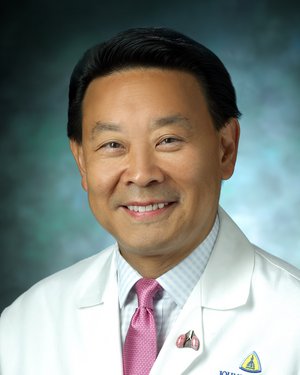Complex, Two-Day Schwannoma Spinal Tumor Removal | Anita’s Story
Background
Dr. Stephen C. Yang is a professor of surgery and medical oncology at Johns Hopkins University School of Medicine and The Johns Hopkins Hospital. In October 2008 he was named the first recipient of The Arthur B. and Patricia B. Modell Professor in Thoracic Surgery.
Dr. Yang is an extreme supporter of medical students, being the only surgeon (amongst 20 chosen from the School of Medicine) for the medical student advisory Colleges system, and is the faculty sponsor for the Surgery Interest Group and the Asian Pacific American Medical Student Association.
Dr. Yang graduated from Duke University with a B.A. in Chemistry and received his M.D. degree from the Medical College of Virginia. He completed his general surgery residency at the University of Texas Health Science Center at Houston, and finished his cardiothoracic surgery fellowship at the Medical College of Virginia. He also completed a 3 year thoracic surgical oncology research fellowship at the University of Texas M. D. Anderson Cancer Center.
He currently serves on the Postgraduate Affairs, Medical School Admissions, Educational Policy, and Curriculum Reform Committees in the Johns Hopkins School of Medicine. He served on numerous national and international committees for these organizations, and is the Taskforce Chair on the Looking to the Future Residency Scholarships for the Society of Thoracic Surgeons He is Editor of Practical Reviews in Chest Medicine and guest editor/ reviewer for numerous peer review journals. He is co-editor of the book Current Therapy in Thoracic and Cardiovascular Surgery, edited the esophageal surgical section in the 2nd edition of Atlas of Gastrointestinal Surgery with John Cameron, M.D., and series editor-in-chief of The Early Diagnosis of Cancer also editing the book volume of The Early Diagnosis of Lung Cancer. In 2001, he and his lung transplant team were featured in the ABC series 24/7 and is currently also being followed in the sequel to that series focusing in on resident and medical student teaching. This series as well as other experiences are still shown on the Discovery Channel. The extensive work in preparing an esophageal cancer patient for surgery on the BBC and the Discovery Channel.
Dr. Yang's laboratory research interests include using molecular techniques for lung cancer screening and for molecular staging of micrometastasis to predict recurrence following surgical resection. His clinical practice and research covers the breath of general thoracic surgery in pulmonary and esophageal surgery, video-assisted and robotics thoracic surgery, mediastinal and pleural work, lung volume reduction surgery for emphysema, and work in geriatric thoracic surgery.
